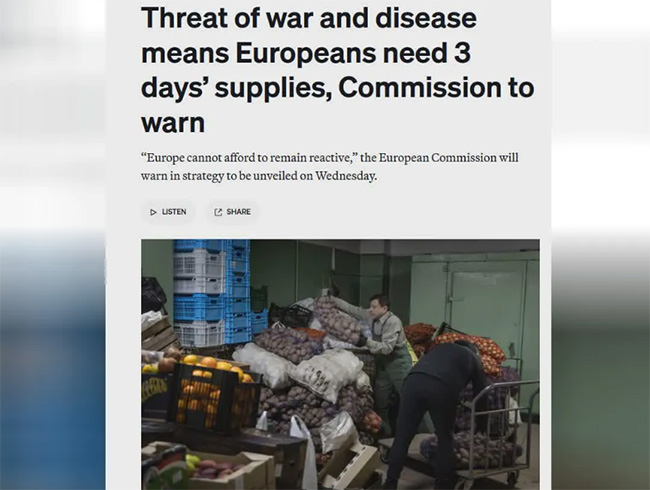
Every citizen should stockpile enough food to be self-sufficient for at least 72 hours in case of crisis, the European Commission is to warn, according to a draft of its Preparedness Union Strategy seen by POLITICO.
“In case of extreme disruptions, the initial period is the most critical,” the document says, setting out possible scenarios, from war to cyber attacks and deadly disease to climate-driven floods.
Five years since the first Covid-19 pandemic lockdowns and three since Russia’s invasion of Ukraine, and with natural disasters and financial shocks an ever-present risk, the plan lands as Europe lurches from one crisis to another. “None of the major crises of the past years were isolated or short-lived,” the document says. “Europe cannot afford to remain reactive.”
According to the 17-page draft, the strategy should “create a secure and resilient EU with the capabilities required to anticipate and manage threats and hazards, independently of their nature or origin.”
That includes providing guidance to member countries to “cover the storage of essential supplies, crisis planning, shelter availability, measures to ensure availability of critical ground and space,” the proposal states.
Just weeks after Europe published its first ever defense strategy, the preparedness plan says it’s “a matter of urgency” for the EU and its countries to strengthen preparedness, across all sectors.
And preparing for war is right up there. While not bringing any new defense initiatives, the strategy proposes a crisis management model drawing from Northern European countries where society as a whole — from citizens to businesses and governments — is involved. The Commission’s plan draws on the conclusions of the Niinistö report, which laid out proposals to improve the EU’s readiness for war and civil defense.
The geopolitical conflict threat can come virtually as well as in the form of military offensives.
One key proposal is to set up a “European cybersecurity alert system,” which the Commission says would improve European threat detection and situational awareness. It also proposes digital training and help for countries hoping to join the EU, and calls for more use of cyber diplomacy and better cooperation with NATO.
“The EU needs to promote cooperation between public and private organisations in strategic sectors such as cybersecurity, ensuring the workforce needs and educational offer are aligned,” according to the draft.
Many people do not know what to do in the face of natural disasters, Commission Executive Vice President Roxana Mînzatu said. “All these types of crises require some set of basic skills, some understanding and knowledge about what to do first,” she said.
The Commission proposes an EU-wide stockpiling strategy to strengthen access to critical resources including for emergency and disaster response, medical countermeasures, critical raw materials, energy equipment and possibly food and water. The strategy will combine centralized EU reserves with countries’ contributions, according to the report.
While some EU countries want to focus investments on defense, others see climate-related issues as more important. Mînzatu argued these are two sides of the same coin.
“You cannot have defense, you cannot have a green Europe without preparedness, and you cannot have preparedness by ignoring the green ambitions and the green targets of the [EU],” she said.
An annex to the draft lists some 60 key actions to be implemented within the next two years, including stepping up monitoring of fake news, assessing the level of preparedness in financial services and working preparedness into school curriculums, all set for this year.
read more in our Telegram-channel https://t.me/The_International_Affairs

 10:40 28.03.2025 •
10:40 28.03.2025 •






















